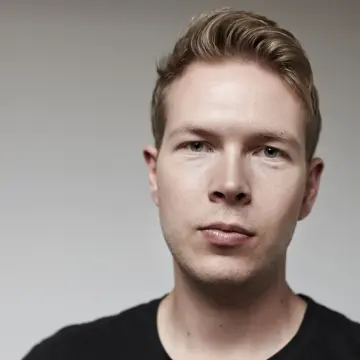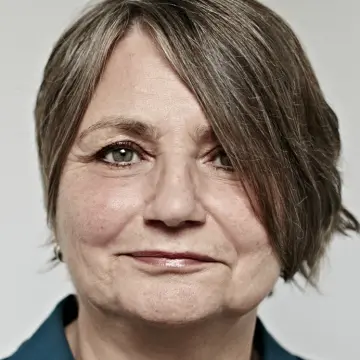Why are young Americans studying Norwegian?
It's not just Norwegian-Americans who are learning the language. "They think Norway is some kind of paradise."

The classroom is full, and first-year students at St. Olaf College in Northfield, Minnesota are ready for another Norwegian lesson.
Some have Norwegian roots. Others are interested in Norway and the welfare state, and would like to work here. A wish to work in conservation is a recurring theme. One student is a singer who wants to sing Norwegian classics.
A few miles away at Luther College in Decorah, Iowa, we meet four Norwegian students who share very different – and sometimes ideological – motivations for learning the language.
Wants to live where it snows
"I plan to take my master’s degree at a university in Norway, and I'd like to reside there eventually."
Simon Argue is a first-year student concerned about the political climate in the US and its future. He loves outdoor life, especially winter activities, and dislikes the changes he's seen back home in Minnesota. The winters are becoming increasingly snowless.
Argue describes himself as politically left-leaning and worries about issues like the US national debt.
He is one of many students motivated by completely different things than Norwegian ancestry.

More Norwegian students
200 years since the first emigrants left
In 2025 it will be 200 years since the first Norwegian emigrants travelled to the USA. Science Norway's reporting trip has been made possible through support from the Fritt Ord Foundation. Science Norway has full editorial freedom.

The Norwegian language still lives on in the areas where Norwegian immigrants once settled.
American Norwegian teachers help keep it alive. But what does the future look like? Will the interest fade as more generations separate Norwegian immigrants in the US from their ancestral homeland?
Not at all, says Maren Johnson, associate professor of Scandinavian language and culture at Luther College in Iowa. She was born and raised in the US, but has Norwegian parents.
"We’ve actually seen an increase in interest here at Luther," says Johnson.
Still, she notes that one thing has clearly changed during her years at the college.

A new reason to learn Norwegian
When Maren Johnson began working at Luther College 11 years ago, two-thirds of the Norwegian students were of Norwegian descent.
She describes a strong interest not only in studying the Norwegian language, but also in Norway as a country.
"Now, only a third have Norwegian ancestry. And that's because people in the US are interested in how the Norwegian welfare system and environmental policies work," says Johnson.
"To study culture, you need language. You really can't understand a culture without knowing its language. They go hand in hand," she says.
Grew up with traditional Norwegian baked goods
Sam Scheffler, from the suburbs of Minneapolis, Minnesota, is a Norwegian-American who wants to reconnect with his linguistic roots and learn more about his Norwegian heritage.
“I grew up with lefse, krumkake, and Norwegian traditions during Christmas.”
His family came to the US in the mid-1800s. His grandparents could understand a bit of Norwegian.
In the summer of 2025, he attended an international summer school in Norway. He also received a scholarship that allowed him to study Norwegian politics in depth.
“I did a research project on public trust in the Norwegian Parliament – which was very interesting,” says Scheffler.

Thought Norwegian students were all lefse eaters
Norwegian teacher Evelyn Galstad at Luther College had her own assumptions before she started teaching. There had to be something that defined Norwegian students.
Most viewed
"I expected them to walk in saying they were from Spring Grove and that they made lefse every Christmas. But they come from everywhere – all kinds of places and backgrounds," says Galstad.
Spring Grove is a small town in Minnesota with a large Norwegian-American population.
"We also get students who've simply heard that Norwegian is a fun language to learn, and that the classes are good, so they decide to give it a try," she says.
"But it's not particularly useful, is it?"
"We kind of use that to our advantage," says Galstad.
A rare skill that draws attention
She's noticed that when her former Norwegian students are interviewed for further studies or jobs, their Norwegian studies attract attention.
"The first question they get in interviews is usually, 'Tell me about these Nordic studies.' People don't see that on many CVs," says Galstad.
She’s Norwegian-American herself and learned the language from her grandfather, who emigrated before World War II.

A bit of a coincidence
For Jacob Bruns, studying Norwegian happened more or less by chance.
“I don’t have a strong connection to Norwegian culture, but I wanted to learn a language – and Norwegian just happened to be the one.”
He actually started back in high school, not because there were Norwegian classes, but because he began studying it on his own initiative.
“But what do you plan to use it for?”
“Good question. I’d like to visit Norway someday. I don’t have as clear a goal as Simon does, but I enjoy learning languages.”
Last semester, it was Mandarin.

"Norwegian is easy"
It's not just in Minnesota that fewer people are studying Norwegian because of their ancestry. The same trend can be seen in the state of Washington, according to Olivia Gunn.
She's an associate professor of Scandinavian Studies at the University of Washington, and is of Norwegian heritage herself.
"Out of six students, only two said they're studying Norwegian because of family ties," Gunn says after her Norwegian language class.
One of the students, an Asian-American, has no connection to Norway.
"He just likes Norway and thinks it's an interesting country. And he thinks Norwegian is easy, which it is," she says.

Wants to live in Norway
Julia Ronning is a third-generation student at Luther College – and she has Norwegian ancestry.
She’s also studying law and plans to become a lawyer.
“I’m not yet sure whether I'll practice here in the US or in Norway. But I'd really like to live in Norway,” she says.
Her grandmother studied Norwegian at Luther, followed by her father, and now Julia is carrying on the family tradition. For her and her family, Norwegian traditions remain very important.
At home, they said Norwegian grace and sang Norwegian Christmas songs, but otherwise didn't speak the language. Still, pride in their Norwegian heritage was always there.
“I’ve heard about Norway all my life, and we never spoke poorly of it. Norway was the best, and we always cheered for Norway during the Olympics and Eurovision.”

Think Scandinavia is a country
Olivia Gunn also teaches Nordic literature. Students often end up in her class by chance. They might, for example, need a literature elective alongside chemistry to complete their degree.
"I do contextualise them so they learn about Scandinavia, but it starts from zero," says Gunn.
Prior knowledge is often minimal – and some students even think Scandinavia is a single country.
Gunn says that the number of Norwegian language students hasn’t declined, but their reasons for studying it have changed.
"There just aren't as many who're driven by their ancestry anymore. I think people are more motivated by the belief that Norway is some kind of paradise," she says.
———
Translated by Alette Bjordal Gjellesvik
Read the Norwegian version of this article on forskning.no
Related content:

Subscribe to our newsletter
The latest news from Science Norway, sent twice a week and completely free.




























































